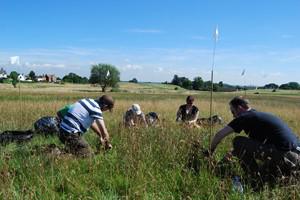Wildflower Garden Set to Bloom at University
Thursday, 04 October 2012

A wildflower area has been created at the University of Worcester using green hay collected from Malvern Hills Common.
The wildflower garden is the latest in a long-line of biodiversity initiatives at the University, which have also seen the introduction of two bee hotels.
Dr Duncan Westbury, Senior Lecturer in Plant Environmental Biology, who has been instrumental in increasing campus biodiversity, said: “By now we should all be aware of the importance of providing resources for our birds and bees, not only by putting up bird boxes and bee hotels, but also by providing them with food.
“Areas managed for wildflowers support numerous bees, butterflies and other insects, but also our garden birds. Wildflower strips can be readily established using commercial seed mixes, but frequently, the seed is from other parts of the UK and in some cases from overseas. Consequently, the plants sown are not adapted to the local conditions and plant vigour as well as genetic diversity might be compromised. The use of local sources of wildflower seed is therefore encouraged.”
Dr Westbury said the use of green hay as a source of local seed to create new wildflower meadows was an “excellent approach”.
“The hay is harvested and collected before the seed is released and is immediately spread over an area of disturbed ground,” he said. “During the first year after sowing, the area is cut frequently to control any grasses and promote establishment of the wildflowers.”
The green hay was collected in collaboration with the Malvern Hills Conservators with help from students and staff at the University.
Dr Westbury said: “We are hoping to create stepping stones of biodiversity across the county by establishing new wildflower areas. In turn this will help wildlife in the immediate area, but will also enhance movement of species across the county landscape. It would be excellent if Worcestershire established more wildflower areas and perhaps Worcester could be the next “Bee Guardian City” alongside Gloucester.”